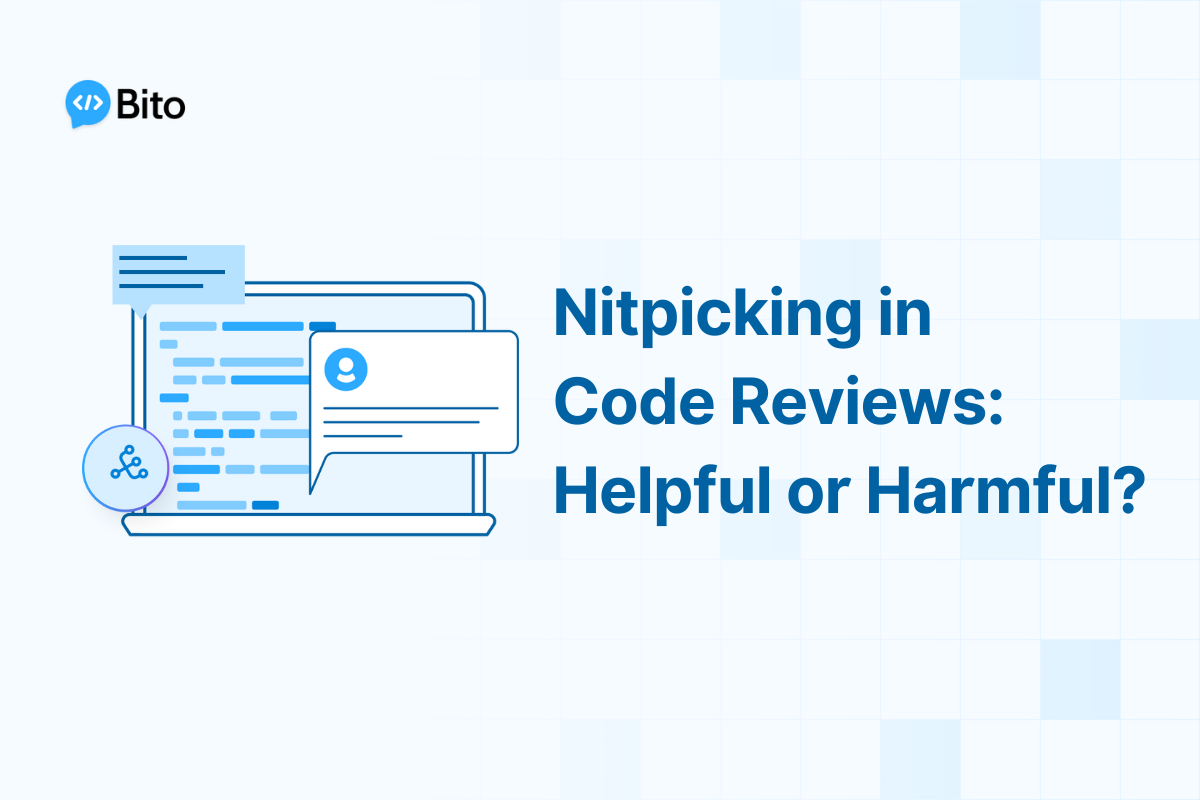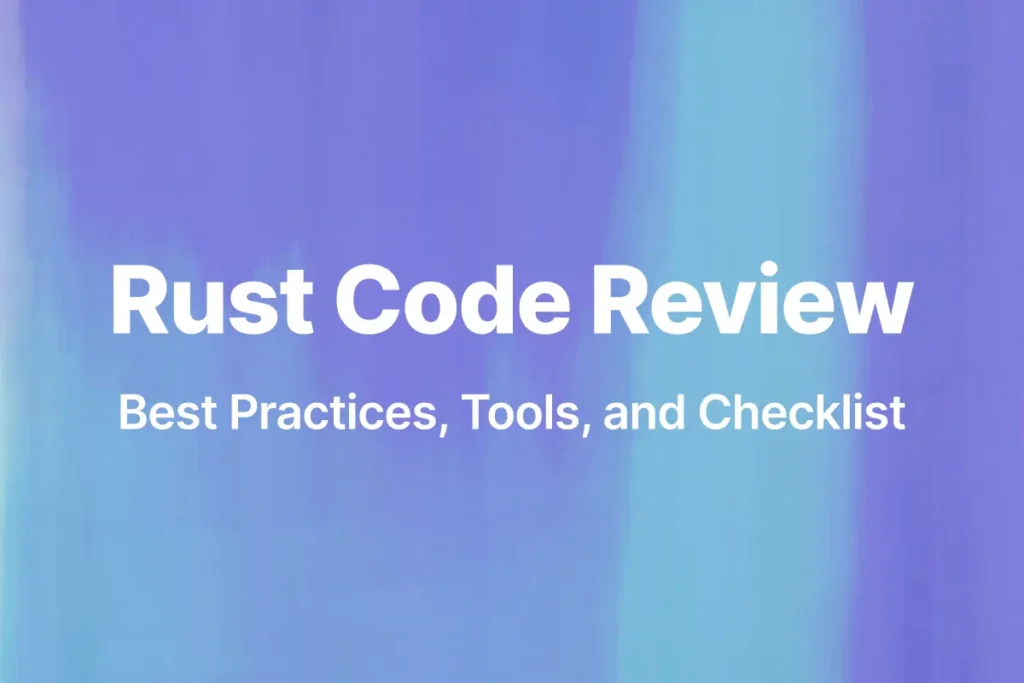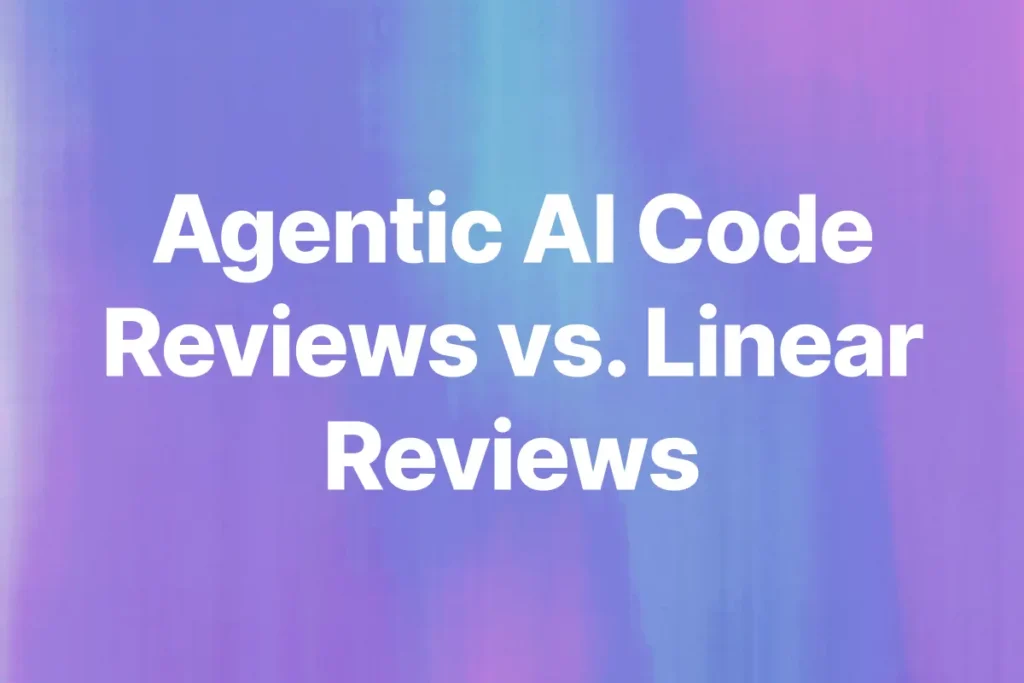Code reviews are a fundamental practice in software development. They ensure code quality, identify bugs, and promote knowledge sharing within a team. However, a common critique of code reviews is the presence of “nitpicking”, where reviewers focus on minor stylistic issues instead of core functionality.
This can be a time-consuming and demotivating experience for both reviewers and developers.
Eliminate nitpicking by automating your code reviews with Bito’s AI Code Review Agent. It’s included in Bito’s 10X Developer Plan. Activate now if you’re a subscriber, or get a 14-day FREE trial if you are not.
What is Nitpicking in Code Reviews?
Nitpicking refers to comments in a code review that focus on minor, non-critical details. This could include:
- Inconsistent indentation or spacing.
- Variable names that could be slightly more descriptive.
- Minor stylistic differences in code formatting.
While these aspects can contribute to overall code readability, they don’t usually affect the core functionality.
The Art of Effective Code Reviews
Instead of nitpicking, effective code reviews focus on providing constructive feedback that improves the overall quality of the code without being overly critical. This requires clear communication, actionable suggestions, and fostering a learning environment. Here’s what this looks like:
Reviewers should frame the review as a collaborative learning opportunity. By explaining concerns clearly and offering specific solutions, reviewers can help the author improve their skills while ensuring the code meets high standards. This fosters a positive environment where everyone involved can learn and grow.
Benefits of Nitpicking (Done Right)
When done constructively, nitpicking can offer some benefits:
- Improved Readability and Maintainability: consistent formatting and clear variable names make code easier for everyone on the team to understand and maintain in the long run. This reduces cognitive load and saves time when revisiting code later.
- Enforcing Coding Standards: code reviews with nitpicks can help ensure developers adhere to established team coding guidelines. Consistency improves codebase aesthetics and makes collaboration smoother.
- Learning and Mentorship: for junior developers, nitpicks can be valuable learning opportunities. Comments suggesting better variable names or alternative approaches can subtly guide them towards better coding practices.
Drawbacks of Nitpicking
While nitpicking can have benefits, excessive focus on minor details can be detrimental:
- Discouragement and Demotivation: A barrage of nitpicks can overwhelm and discourage the code author. It can make them feel like their work is constantly under scrutiny, impacting their confidence and motivation.
- Negative Culture and Slow Development: Code reviews overloaded with nitpicks can create a culture of negativity within the team. This can lead to reviewers becoming hesitant to share code and slow down the development process.
- Distraction from Bigger Issues: Focusing on minor stylistic details can divert attention from more critical problems. Bugs, logic errors, and architectural issues can be buried under an avalanche of nitpicks, delaying their identification and resolution.
Should We Stop Nitpicking Altogether?
It’s important to recognize that attention to detail is valuable in code reviews. Identifying typos, inconsistent formatting, or minor code smells can prevent future bugs and improve code readability. However, the key is to strike a balance between catching critical issues and creating a positive review experience.
Finding the Balance: Constructive Feedback vs. Nitpicking
Striking a balance between ignoring stylistic details and getting bogged down in nitpicks is key to effective code reviews.
When providing feedback, don’t just point out problems; explain why they matter. Explain how a specific suggestion can improve readability or maintainability. This context and rationale helps the author understand the reasoning behind the feedback and fosters a learning environment.
Also, try to prioritize your feedback. Not all issues are created equal. Address critical bugs and logic errors first. Save comments on minor formatting issues for later if time allows. This ensures the most important problems are addressed without derailing the review process.
Finally, communication and collaboration are essential. Establish clear guidelines on code style and formatting. This reduces ambiguity and helps developers understand what’s expected.
Utilize automated tools like Bito’s AI Code Review Agent that can identify code smells and anti-patterns, catch security vulnerabilities such as SQL injection and cross-site scripting (XSS), and provide insights into code maintainability. In addition to identifying problems, the agent can also suggest ways to improve code. This can include suggestions for refactoring code, improving readability, and making code more efficient.
How to Handle Nitpicky Code Reviewers
Let’s face it, sometimes you’ll encounter a reviewer who seems overly focused on minor details. Here’s how to navigate such situations:
- Understand the Intent: Remember, the reviewer might be genuinely trying to improve the code.
- Open Communication: Don’t be afraid to have an open conversation to understand the reviewer’s concerns.
- Focus on Impact: If an issue seems irrelevant, politely explain why it doesn’t significantly impact the code’s functionality or maintainability.
Tips for Reviewers:
- Be mindful of the impact of your comments. Consider how your feedback might affect the author.
- Focus on clarity and maintainability. Does your feedback help make the code easier to understand and work with in the long run?
- Prioritize effectively.
- Offer suggestions, not directives. Collaboration and learning should be at the core of code reviews.
Tips for Code Authors:
- Be receptive to feedback. Even nitpicks can sometimes highlight areas for improvement.
- Ask clarifying questions. If a comment seems unclear, seek clarification from the reviewer.
- Address critical feedback first. Ensure bugs and logic errors are fixed before addressing stylistic issues.
Conclusion
Code reviews are a vital tool for ensuring code quality and fostering collaboration. However, focusing solely on minor details during a code review can be counterproductive. By striking a balance between constructive feedback and avoiding nitpicking, teams can leverage the power of code reviews to improve code quality, promote learning, and maintain a positive development environment.
Here are some key takeaways:
- Focus on actionable feedback: Suggest improvements instead of just pointing out problems.
- Prioritize: Address critical bugs and logic errors first.
- Communicate and collaborate: Establish clear coding guidelines and leverage automation for basic checks.
- Be mindful of your impact: Strive for comments that are helpful, respectful, and focused on long-term code maintainability.
By fostering a culture of constructive feedback and collaboration, teams can turn code reviews into a powerful tool for building high-quality, maintainable software.






